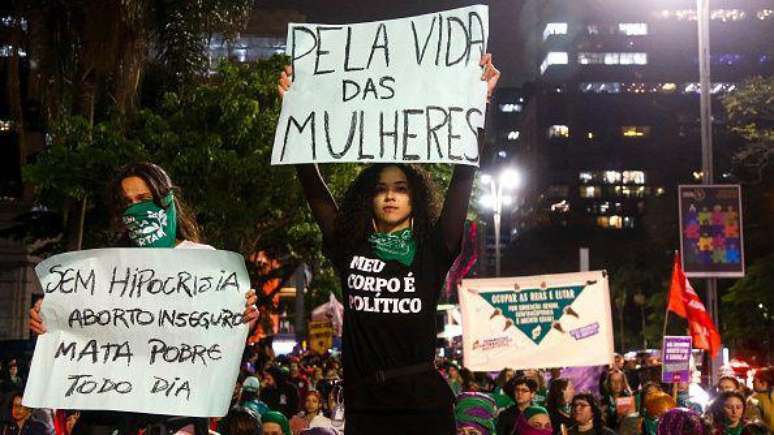The bill can be voted on urgently, which eliminates the need for debates and opinions in national congressional committees. Understand how the possible passage of a new law could affect the right to abortion in cases where the procedure is permitted by Brazilian law.
A bill signed by 32 deputies intends to equate any abortion carried out in Brazil after the 22nd week of pregnancy to the crime of murder.
The rule would also apply to cases where the procedure is authorized by Brazilian law, such as in the case of a pregnancy resulting from rape.
PL 1904/2024, whose first author is the deputy Sóstenes Cavalcante (PL/RJ), adds some paragraphs to four articles of the Brazilian Penal Code, established in 1940.
Article 124 of the civil code, for example, already establishes as a crime “causing oneself or allowing others to have an abortion”.
But, according to the new proposal under discussion in the Chamber of Deputies, “when there is the viability of the fetus, presumed in pregnancies exceeding 22 weeks, the sanctions provided for the crime of simple murder will be applied”.
On June 4, MP Eli Borges (PL/TO), who also signed the document, requested that the bill be examined urgently.
This means that the proposal would be voted directly by the plenary of the Chamber, without the need for debates and opinions in the thematic commissions of Congress.
This request for urgent consideration could be placed on the agenda by the President of the Chamber of Deputies, Arthur Lira (PP/AL), in the coming days.

Victims of violence
PL 1904/2024 intends to modify some articles of the Criminal Code, with the aim of preventing any abortion from being carried out when the pregnancy exceeds 22 weeks.
Brazilian law currently allows abortion in three situations:
- When the pregnancy is the result of rape;
- If the pregnancy represents a risk to the woman’s life;
- If the fetus is anencephalic, a condition characterized by the absence of the brain and skullcap.
In an article published on the website of the Brazilian Center for Health Studies (Cebes), Dr. Ana Costa, executive director of the institute, classifies the bill as “a re-edition of the ‘Rapist Statute’, which forces women to remain pregnant as a result of rape, under penalty of imprisonment”.
Cebes also highlights that late access to legal abortion “reflects inequalities and injustices in health care, with a particular impact on children (10-14 years old), poor women, black women and those living in rural areas “.
A group of 18 industry entities also came together to create the “Child is Not a Mother” campaign, which characterizes the proposed changes to the law as the “Child Pregnancy Law.”
According to the movement’s creators, the legislative change will especially harm children under 14, who represent the largest group in need of abortion services after the third trimester.
According to them, in this age group – in which every pregnancy is the result of an alleged rape – it takes longer to discover or even identify a pregnancy.
Furthermore, in two thirds of cases, the perpetrator of the rape belongs to the girl’s family, which prevents the victim from contacting health services or reporting the crime to the authorities in the first weeks of pregnancy.
The campaign also highlights that any change to the law will mean that those involved in abortion could be convicted of the crime of simple murder, with a prison sentence of up to 20 years.
Meanwhile, the legislation provides for a sentence of around 10 years – or half that time – for the crime of rape.
According to the Brazilian Public Security Yearbook, 74,930 people were raped in Brazil in 2022. Of these, 88.7% of the victims were women and approximately 60% were aged 13 or under.
DataSUS reports that, in 2019, approximately 70 pregnancies were legally terminated in Brazilian children and adolescents under the age of 14.
The campaign warns that, if approved, the project “will force girls who are victims of violence to continue their pregnancies” and this will mean a step back “to the sexual and reproductive rights guaranteed by law since 1940”.

What supporters of the project say
The project under discussion in the Chamber argues that the Penal Code, established in 1940, does not establish this limit of 22 weeks because “an abortion in the last trimester was an unthinkable reality [naquela época] and, if it were possible, no one would call it abortion, but murder or infanticide.”
The text of the project also claims that, “to guarantee women the right to terminate a pregnancy, regardless of the gestational age, and whatever the weight of the unborn child, it was necessary to subvert the basic principles of the rule of law, the same ones that gave rise to American independence and modern democracy.”
According to the MPs’ proposal, people involved in an abortion after the 22nd week of gestation – such as the woman and the healthcare worker – can be convicted of the crime of simple murder.
Currently, sentences for simple murder in Brazil range from 6 to 20 years in prison.
On social networksMP Sóstenes Cavalcante wrote that PL 1904 “aims to consider late-term abortion as murder, strengthening the protection of life from conception”.
The project was filed on May 17. On the same day, the Minister of the Federal Supreme Court (STF), Alexandre de Moraes, had suspended a decision of the Federal Council of Medicine (CFM) that prohibited so-called fetal asystole.
This procedure, recommended by the World Health Organization (WHO) as one of the stages of abortion resulting from rape in the last trimester of pregnancy, uses drugs to stop the fetus’s heartbeat before it is removed from the uterus.
According to Moraes, the CFM resolution exceeded the regulatory competence of the Council and imposed “both on the doctor and on the pregnant victim of rape a restriction of rights not provided for by law capable of creating concrete embarrassments and significantly worrying for women’s health”.
The STF minister also recalled that Brazilian legislation does not provide any “circumstantial, procedural or temporal” limitation for the performance of abortion provided for by law.
Moraes’ decision was preliminary and will be discussed in the future full court of the Supreme Court. The CFM also appealed against the minister’s opinion.
Source: Terra
Rose James is a Gossipify movie and series reviewer known for her in-depth analysis and unique perspective on the latest releases. With a background in film studies, she provides engaging and informative reviews, and keeps readers up to date with industry trends and emerging talents.







